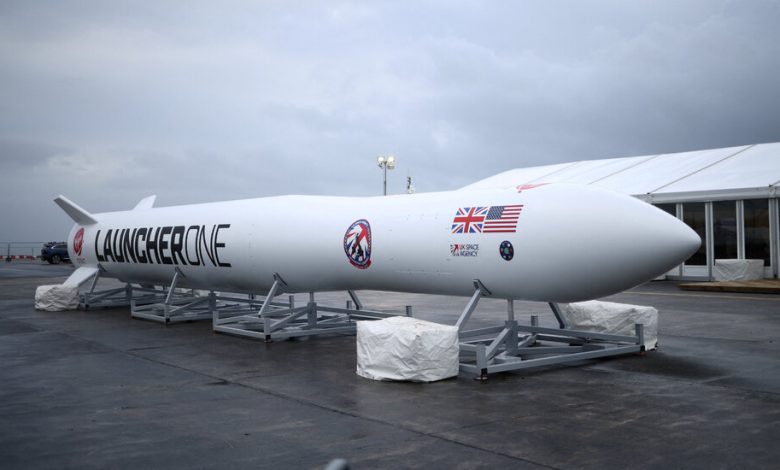Britain Is on the Verge of Its First Satellite Launch

Britain is hoping to get into the space launch business on Monday night, after a modified Boeing 747 carrying a 70-foot rocket under its wing stuffed with satellites took off from an airstrip in Cornwall, in southwest England. If the weather and other conditions are favorable, the launch will be the first time satellites have launched from British soil.
An hour after takeoff, off the southern coast of Ireland, the plane is expected to drop the rocket, which would fire and take nine satellites up into low orbital positions 300 or more miles above the Earth. People in Britain’s space industry say the breakthrough would have huge importance even though the launch service is being provided by a California company, Virgin Orbit, which was founded by the entrepreneur Richard Branson.
The ability to put satellites in space “will complete the picture for the U.K.,” said Doug Liddle, chief executive of In-Space Missions, a British satellite maker. “We are now a proper, space-faring nation,” he added. Mr. Liddle spoke Monday afternoon from a highway service area on his way to Cornwall, where two surveillance satellites made by his company, with funding from agencies of the British and U.S. militaries, would be on the Virgin Orbit rocket.
British companies have for years manufactured satellites, only to have to rely on rockets in places like Cape Canaveral or New Zealand to haul them into space. Having launch sites available in Britain “makes a huge difference in terms of being able to develop satellites and to fly them,” said Emma Jones, head of U.K. business development for RHEA Group, a space security firm, which also has a satellite on the Virgin Orbit rocket.
The expected launch would be the first big payoff of an effort by the British government to boost the country’s space industry in the wake of Brexit, which has strained scientific and business ties with the European Union, the country’s main trading partner.
Work at Newquay Airport in Cornwall to make it ready to handle satellites cost about 20 million pounds, or $24 million, financed with government and private money, according to Melissa Thorpe, head of Spaceport Cornwall. Ms. Thorpe said she expected launches to generate revenue by the fifth year of operation.
While the current launch has been delayed for around two months, and the next one is not yet scheduled, Dan Hart, Virgin Orbit’s chief executive, said Britain’s effort seemed to have all the elements necessary to launch satellites. Virgin Orbit has already launched satellites from the United States and wants to establish itself as a company that can do so from anywhere a 747 can land.
“Just like in the U.S., it is a combination of commercial, civil and national security coming together that makes a space program or a space launch program successful,” he said in an interview.
Mr. Hart said the payload on the Virgin Orbit rocket, which includes commercial satellites as well as devices sponsored by Britain’s Ministry of Defense and the U.S. Naval Research Laboratory, was an “excellent model” for the combined funding sources needed to sustain the expense of a full-service space program.
Now that the British authorities have had a run-through on the regulatory and other work necessary for a space launch in densely populated Western Europe, the process should be smoother next time.
“We’ve had to work very closely with Portugal, with Spain and Ireland,” because the Virgin plane “will fly through their controlled airspace,” said Ian Annett, deputy chief executive of the U.K. Space Agency, which helped finance the launch. He said that commercial airlines would have to reroute flights to stay out of the way.
Working out such arrangements led to delays. “Clearly the first launch was an expensive undertaking,” Mr. Hart said. Virgin Orbit had to keep its launch team in Britain since October, making the exercise far more costly than expected, although the company said precisely how much more would be hard to estimate.
He said Virgin Orbit was eager to return, although there were funding and other details to work out before the next launch date could be set. Virgin Orbit usually charges around $12 million for a launch, although the fees can vary.
Britain already has a sizable satellite industry and has been one of the leaders in designing and making the shoe-box-size, relatively cheap devices that are becoming increasingly important for communications, surveillance and other purposes.
The government figures that having the ability to send these satellites into orbit should give Britain a further edge. With modest funding, the government has encouraged receptive local authorities, like the one in Cornwall and others in Scotland, to develop sites suitable to have either vertical rocket launches or jumbo jets used as launch platforms.
Ms. Jonesof RHEA Group said the prospect of having launch sites in Britain had encouraged her employer, a private Belgian company, to have its device built at Harwell, near Oxford, where there is a cluster of space companies.
Ms. Jones’s satellite is the type that analysts say represents a growth area for the space industry. The box, which measures about a foot by four inches by four inches, cost less than $1 million to build and is intended to be the first of a string of orbital vehicles that could be called into service if a cyberattack or a technical problem knocked out the GPS navigation system.
Ms. Jones also said she was not worried about dependence on Virgin because other launch providers in Britain were likely to be available soon.
Indeed, Mr. Annett of the U.K. Space Agency said he expected launches “in the next year” from two sites being prepared in Scotland, on the Shetland Islands, and in Sutherland, on the mainland.
